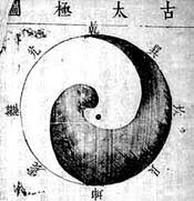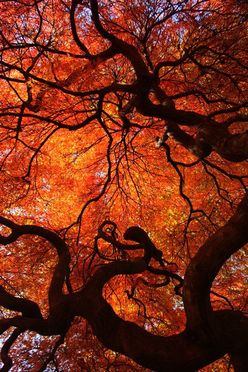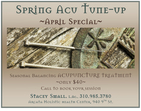
Most people are familiar with the concepts of yin & yang. Yin & yang theory are at the heart of Chinese Medicine. The United States and most other Western industrialized nations are the perfect example of what happens when the balance tips to one of these extremes. In the West, the focus is on outward directed activity, productivity, which leaves little time for rest, relaxation, rejuvenation and inward directed activity or yin nourishing activity. There is very little time or priority given to truly nourish ourselves. As a result we could say, as a whole, our society has become yang dominate or yin deficient.
In the Unites States we tend to foster judgment and even feel sorry for or look down on countries like India and other deeply devotional countries that spend a lot of their time doing spiritual practice and religious focused activities. We wonder why they do not focus more on maximizing their resources and prioritizing wealth and status. Some of us envy these countries who seem to live a more yin lifestyle of meditation and a spiritually centered existence. We envy them because we ourselves are hungry for and starved, if you will, for more yin in our own lives.
Many people are increasingly feeling more anxious, overwhelmed, burdened and hurried. These are symptoms of too much yang and not enough yin to create a counterbalancing effect. What we see in addition to the stress created from a life out of balance and lacking yin nourishment is a kind of spiritual emptiness. This can manifest as depression and a lack of meaning in ones life. For some the emptiness is deeply apparent, for others it is present, but less apparent. We all experience it to some degree. Even the so called great spiritual masters, still human are subject to the earthly desire realm and consequently have to deal with the push and pull of modern living on earth.
This yin deficiency, and the accompanying feelings of emptiness, disconnect, anxiety and overwhelm leads us to try to compensate by engaging in negative and self destructive behaviors and thought processes that are intended to fill the void we feel or alleviate the uncomfortable feelings we experience. Unfortunately, many of the ways we are trying to fill these voids in our lives end up being more harmful to our mental, physical and spiritual health. They do not really help restore balance even though the discomfort of our imbalance may be temporarily placated. How we compensate differs from person to person, but ultimately we are all seeking balance. Homeostasis is a human imperative.
Maybe we have lost someone close to us, this often can create a hole of sorts in our hearts (metaphorically). Some people instead of working through the grief and repairing the hole seek to patch it by indulging in certain negative behavior patterns. These patterns can take the form of addiction. Addiction does not have to be drug dependency or alcohol abuse. It can be an unhealthy relationship with food, overeating, undereating, eating the wrong things. It can be repetitive patterns of attracting certain kinds of people that bring more negativity or abuse to our lives. It can be an addiction to something seemingly healthful like meditation.
From a Chinese Medicine perspective our lives must have balance if we are to thrive in all spheres of our lives. Yang must be balanced with yin, as yin must be balanced with yang. So the person who sits in full lotus position every waking moment is engaging in an extremely yin behavior pattern and when confronted with some yang activity, like a social outing, may have some difficulty in that situation. Our addictions or habitual behavioral patterns tend to be yang in nature, again, due to the cultural climate in which we live. Exercise is another good example. I have known many people who simply cannot function without exercising every day. They would rather forfeit an intimate night with their spouse, an outing with their family or anything else for that hour at the gym.
SO how do we find balance in an imbalanced world? It is not easy, but it can be done. Acupuncture is an excellent tool that can help bring the body back into balance, but even acupuncture has its limits. It too can become a crutch or addiction of sorts. Each individual must be empowered to be actively making choices and prioritizing activities that bring balance and wholeness rather than more stress and anxiety to their lives. Acupuncture is a powerful tool that can help a person who is ready to make significant lifestyle changes. I always think of it this way. If you are having pain in your neck from sitting slouched over your computer everyday and you go for a chiropractic adjustment, the chiropractor may realign your neck, but if you show up to work the next day and slouch over your computer for 8 hours, your neck is surely to feel painful by the days end. So if you were to go into work and every half an hour get up and stretch and take a mindful approach to your posture while at work, then that change would make the money and time spent at the chiropractors worthwhile. Sometimes there is a willingness to change but for whatever reason there is some obstacle, we feel stuck and just cannot move forward. This too is a good time to reach outwardly and seek the help of an acupuncturist or counselor or whatever may help to get you moving in the direction you seek.
So getting back to finding balance in our yang world... What can we do to replenish the yin we so desperately are seeking through negative and unhealthful behaviors? Anything that is truly nourishing. Good nutritious healthful food that is appropriate for our constitutional type is a way to nourish our yin. Rest, even ten minutes a day of truly doing nothing is another, just sitting still can be nourishing. Meditation, yoga, visualization, any kind of inward discipline that takes the focus from the outside in can help nourish our yin energy. Chinese herbs can be very helpful. There are several yin nourishing or tonifying herbs available if our yin deficiency has reached the level that it is actually affecting our physical health. Journaling, reading, walking quietly, sitting at the beach, Tai Qi & Qi Gong are all excellent, internally focused activities which can help cultivate & balance energy and produce calm.
If you are ready to break unwanted habit patterns and find balance and wellness in your life Acupuncture and Traditional Chinese Medicine may be a great place to start.
Stacey Small, L.Ac., licensed acupuncturist and herbalist has been in practice for more than 20 years. For a free phone consultation call 310.985.3780 or email [email protected]
In the Unites States we tend to foster judgment and even feel sorry for or look down on countries like India and other deeply devotional countries that spend a lot of their time doing spiritual practice and religious focused activities. We wonder why they do not focus more on maximizing their resources and prioritizing wealth and status. Some of us envy these countries who seem to live a more yin lifestyle of meditation and a spiritually centered existence. We envy them because we ourselves are hungry for and starved, if you will, for more yin in our own lives.
Many people are increasingly feeling more anxious, overwhelmed, burdened and hurried. These are symptoms of too much yang and not enough yin to create a counterbalancing effect. What we see in addition to the stress created from a life out of balance and lacking yin nourishment is a kind of spiritual emptiness. This can manifest as depression and a lack of meaning in ones life. For some the emptiness is deeply apparent, for others it is present, but less apparent. We all experience it to some degree. Even the so called great spiritual masters, still human are subject to the earthly desire realm and consequently have to deal with the push and pull of modern living on earth.
This yin deficiency, and the accompanying feelings of emptiness, disconnect, anxiety and overwhelm leads us to try to compensate by engaging in negative and self destructive behaviors and thought processes that are intended to fill the void we feel or alleviate the uncomfortable feelings we experience. Unfortunately, many of the ways we are trying to fill these voids in our lives end up being more harmful to our mental, physical and spiritual health. They do not really help restore balance even though the discomfort of our imbalance may be temporarily placated. How we compensate differs from person to person, but ultimately we are all seeking balance. Homeostasis is a human imperative.
Maybe we have lost someone close to us, this often can create a hole of sorts in our hearts (metaphorically). Some people instead of working through the grief and repairing the hole seek to patch it by indulging in certain negative behavior patterns. These patterns can take the form of addiction. Addiction does not have to be drug dependency or alcohol abuse. It can be an unhealthy relationship with food, overeating, undereating, eating the wrong things. It can be repetitive patterns of attracting certain kinds of people that bring more negativity or abuse to our lives. It can be an addiction to something seemingly healthful like meditation.
From a Chinese Medicine perspective our lives must have balance if we are to thrive in all spheres of our lives. Yang must be balanced with yin, as yin must be balanced with yang. So the person who sits in full lotus position every waking moment is engaging in an extremely yin behavior pattern and when confronted with some yang activity, like a social outing, may have some difficulty in that situation. Our addictions or habitual behavioral patterns tend to be yang in nature, again, due to the cultural climate in which we live. Exercise is another good example. I have known many people who simply cannot function without exercising every day. They would rather forfeit an intimate night with their spouse, an outing with their family or anything else for that hour at the gym.
SO how do we find balance in an imbalanced world? It is not easy, but it can be done. Acupuncture is an excellent tool that can help bring the body back into balance, but even acupuncture has its limits. It too can become a crutch or addiction of sorts. Each individual must be empowered to be actively making choices and prioritizing activities that bring balance and wholeness rather than more stress and anxiety to their lives. Acupuncture is a powerful tool that can help a person who is ready to make significant lifestyle changes. I always think of it this way. If you are having pain in your neck from sitting slouched over your computer everyday and you go for a chiropractic adjustment, the chiropractor may realign your neck, but if you show up to work the next day and slouch over your computer for 8 hours, your neck is surely to feel painful by the days end. So if you were to go into work and every half an hour get up and stretch and take a mindful approach to your posture while at work, then that change would make the money and time spent at the chiropractors worthwhile. Sometimes there is a willingness to change but for whatever reason there is some obstacle, we feel stuck and just cannot move forward. This too is a good time to reach outwardly and seek the help of an acupuncturist or counselor or whatever may help to get you moving in the direction you seek.
So getting back to finding balance in our yang world... What can we do to replenish the yin we so desperately are seeking through negative and unhealthful behaviors? Anything that is truly nourishing. Good nutritious healthful food that is appropriate for our constitutional type is a way to nourish our yin. Rest, even ten minutes a day of truly doing nothing is another, just sitting still can be nourishing. Meditation, yoga, visualization, any kind of inward discipline that takes the focus from the outside in can help nourish our yin energy. Chinese herbs can be very helpful. There are several yin nourishing or tonifying herbs available if our yin deficiency has reached the level that it is actually affecting our physical health. Journaling, reading, walking quietly, sitting at the beach, Tai Qi & Qi Gong are all excellent, internally focused activities which can help cultivate & balance energy and produce calm.
If you are ready to break unwanted habit patterns and find balance and wellness in your life Acupuncture and Traditional Chinese Medicine may be a great place to start.
Stacey Small, L.Ac., licensed acupuncturist and herbalist has been in practice for more than 20 years. For a free phone consultation call 310.985.3780 or email [email protected]



 RSS Feed
RSS Feed
